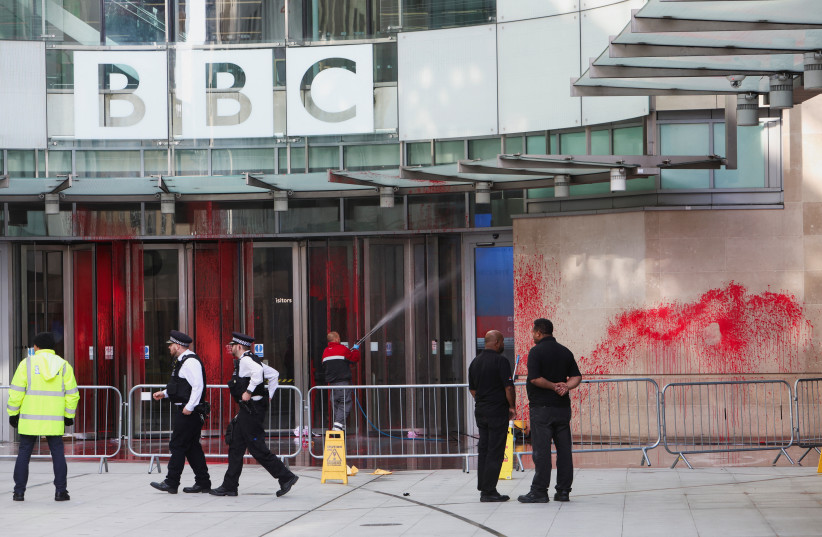On October 12, two British Israelis whose family members are being held hostage in Gaza attended a media conference in London, an event carried by the major TV networks. Noam Sagi and Sharon Lifschitz both have parents who were taken hostage during the Hamas attack on October 7.
Sagi, a London-based psychotherapist who grew up in Israel, said that his mother, Ada Sagi, was taken hostage from the Nir Oz kibbutz. He said that as he spoke, “I should have been on the way to Heathrow to pick up my mum, who was coming to celebrate her 75th birthday here today in London.”
Speaking directly to the camera, he called on the BBC to call Hamas “what it is.”
He was referring to the storm of controversy that began sweeping across the UK from the moment the BBC started reporting on the Hamas atrocity on Saturday, October 7.

The next day, Britain’s Sunday Telegraph published an article by a former director of BBC Television deploring the fact that the BBC was deliberately avoiding describing those who had perpetrated the shocking slaughter as terrorists.
“Across its platforms,” he wrote, “the BBC describes the actions of ‘militants,’ as if shooting children in cold blood is some part of conventional military warfare. It is nothing of the sort. It is murder, pure and simple. It is terrorism.”
Jewish groups took up the call. “The murder and massacre of innocent civilians,” declared the Simon Wiesenthal Center, “is terrorism, straight and simple,” and the UK’s national broadcaster should describe it as such.
The BBC’s Editorial Guidelines for its journalists and news staff have a specific section on Israel and Palestine: “Care is required in the use of language that carries value judgments,” they state. The guidelines forbid the use of the word “terrorist” in the BBC’s own reports but permit its use when it can be attributed to an individual or organization. They advise using terms such as “bomber,” “attacker,” “gunman,” “kidnapper,” “insurgent,” or “militant.’”
Powerful voices condemn BBC's policy
By October 11, other powerful voices had been raised in condemnation of the BBC’s policy, starting at the top. British Prime Minister Rishi Sunak deplored the use of the word “militants” – meaning fighting forces. “Hamas are not militants,” he said. “They are not freedom fighters. They are terrorists.”
Britain’s Chief Rabbi Sir Ephraim Mirvis said in a broadcast interview, “I noticed that the BBC has a reluctance to use the term ‘terrorist.’ If one doesn’t use the term ‘terrorist,’ it is as if one is providing a window of opportunity for justification, and nothing can justify this.”
Others have also spoken out against the BBC’s coverage. Marie van der Zyl, president of the Board of Deputies of British Jews, has said that she complained to the BBC’s director general, Tim Davie, about its coverage, but the BBC refused to change its Editorial Guidelines. Instead, the broadcaster put up one of its most senior and respected journalists, John Simpson, to explain its position.
Writing on the BBC’s web page on October 12, he said: “‘Terrorism’ is a loaded word which people use about an outfit they disapprove of morally. It’s simply not the BBC’s job to tell people who to support and who to condemn…We regularly point out that the British and other governments have condemned Hamas as a terrorist organization, but …the key point is that we don’t say it in our voice…We don’t take sides…That’s why people in Britain and right round the world, in huge numbers, watch, read, and listen to what we say, every single day.”
A few days later, eminent journalist and historian Simon Heffer responded.
“I simply cannot agree with the defense he has made of the Corporation’s decision not to call Hamas ‘terrorists’…Parliament designated Hamas in its entirety as ‘a proscribed terrorist organization’ in November 2021… That legitimizes calling Hamas ‘terrorists’…
“Simpson says that ‘it’s simply not the BBC’s job to tell people who to support and who to condemn.’ Describing a group using a legally defined term that our legislators have decided to apply to it does not instruct people whom to support and whom to condemn – it simply recognizes a legal fact that is obvious to most of the BBC’s audience…”
On October 12, the Daily Telegraph devoted its lead article to the subject. “How do we describe people who, armed to the teeth, infiltrate peaceful gatherings and commit wanton slaughter of men, women and children?...Most people would have little difficulty calling this terrorism, and yet the BBC refuses to do so. The Hamas gunmen who committed these atrocities are described as militants, or activists or insurgents…There should be no moral ambiguity here. It is time for the BBC and others to call Hamas what it is: a terrorist organization.”
Yet the BBC stands firm, and the controversy rumbles on. ■
The writer’s latest book is Trump and the Holy Land: 2016-2020. Follow him at www.a-mid-east-journal.blogspot.com
